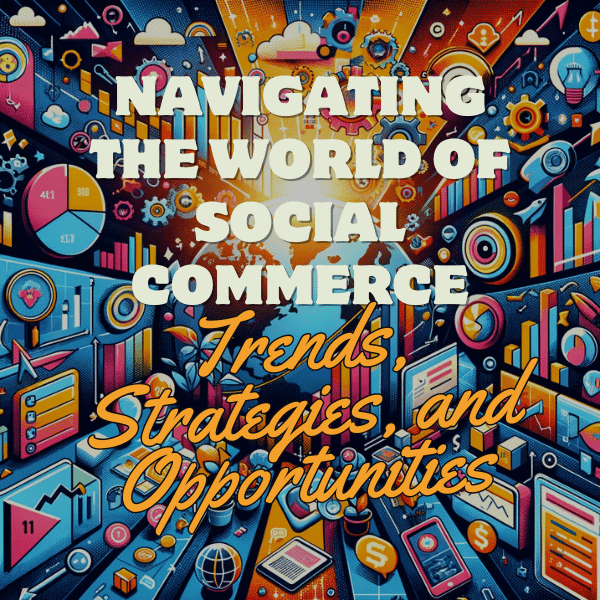Why you can trust Sunlight Media
- Expertise and Experience:Our content is crafted by seasoned professionals with extensive experience in digital marketing, ensuring you receive accurate and actionable advice.
- Unbiased Information:We provide impartial insights and recommendations based solely on what's best for your business, without any hidden agendas or promotions.
- Thorough Research:Our articles are backed by comprehensive research and the latest industry trends, ensuring you stay informed with reliable and up-to-date information.
- Transparency and Honesty:We believe in complete transparency. We disclose our sources, methodologies, and any potential conflicts of interest, so you can trust the integrity of our content.
- Continuous Improvement:We constantly review and update our content to reflect the latest developments in digital marketing, so you always have access to the most current and relevant information.

Introduction to Social Commerce: Understanding the Fusion of Social Media and Online Shopping

In the dynamic digital era, the fusion of social media platforms and online shopping has given rise to a revolutionary concept known as ‘social commerce.’ This blend is reshaping how social media users interact with brands and make purchasing decisions. Social commerce, a term that has gained significant momentum over the past few years, refers to the process of selling products directly through social media platforms. It’s not just a trend; it’s an evolving marketplace that combines e-commerce with the interactive and engaging nature of social platforms.
The allure of social commerce lies in its ability to transform the entire shopping experience. It simplifies the buying process, allowing consumers to purchase products with just a few clicks, directly from their favorite social media platforms. This seamless integration encourages customers to engage with brands in a more natural and intuitive way. It’s about leveraging the power of social media channels not just for marketing strategies but for actual sales transactions.
Platforms like Facebook Shops and Instagram Shopping have emerged as frontrunners in this domain, offering businesses new avenues to sell products and build brand awareness. These social commerce platforms are not mere extensions of online stores; they offer unique features like in-app checkout, shopping tags, and the integration of augmented reality for product discovery. This makes the shopping journey more engaging and personalized, catering to the modern consumer’s need for convenience and immediacy.
Furthermore, social commerce also involves strategies like influencer marketing and user-generated content to generate social proof and boost sales. These tactics help in creating a trustworthy and relatable online shopping experience. As social commerce continues to grow, it’s crucial for businesses to understand its impact and potential to transform the way consumers interact and shop on social media sites.
Evolving Social Commerce Trends: How They’re Shaping Consumer Behavior

The landscape of social commerce is rapidly evolving, driven by innovative trends that are reshaping consumer behavior on social media platforms. In recent years, the emergence of social commerce trends has revolutionized the way social media users engage with brands and participate in online shopping. This shift is not just a fleeting change but a significant transformation in the digital marketing and retail sectors.
One of the key trends in this domain is the integration of social commerce features across various social platforms. Platforms like Facebook and Instagram have expanded their capabilities, introducing native social commerce tools like Facebook Shop and Instagram Shops. These features enable users to seamlessly explore and purchase products without leaving their social feeds, offering a highly integrated and immersive online shopping experience.
The rise of influencer marketing within social commerce has also been pivotal. Influencers, particularly micro-influencers, have become essential in driving consumer trends and encouraging customers to engage with brands on a more personal level. Their authentic content and targeted reach provide a unique opportunity for businesses to connect with potential customers, increasing online sales and building brand awareness.
Additionally, the use of user-generated content in social commerce strategies has strengthened the bond between consumers and brands. This approach leverages the authenticity and trust associated with customer-created content, enhancing the entire shopping experience on social media channels. By showcasing real-life uses and satisfaction, user-generated content serves as powerful social proof, influencing purchasing decisions and boosting consumer confidence.
In summary, the evolving trends in social commerce are significantly influencing how consumers interact with brands on social media sites, paving the way for more personalized and engaging online shopping experiences.
Leveraging Influencer Marketing: Building Trust and Engagement in Social Commerce

Influencer marketing has become a cornerstone in the realm of social commerce, profoundly impacting how brands engage with social media users and drive online shopping behavior. This marketing strategy harnesses the influence of social media personalities to promote products and services, leveraging their credibility and reach to engage potential customers. Influencers, especially micro-influencers, have emerged as powerful allies for brands looking to tap into niche markets and build authentic connections with their target audience.
Micro-influencers, known for their smaller but highly engaged followings, play a crucial role in this landscape. They offer a more genuine and relatable approach, making them ideal for targeted influencer marketing campaigns. Their content resonates with specific audience segments, leading to higher engagement rates and stronger brand loyalty, which are vital for successful social commerce strategies.
In the context of social commerce, influencers can effectively showcase products through their personal experiences, generating user interest and facilitating product discovery. They also contribute significantly to creating user-generated content, which acts as social proof, enhancing the credibility and appeal of the products they endorse. This approach not only boosts sales but also fosters a sense of community and trust around a brand.
The integration of influencer marketing into social commerce strategies is an impactful way for businesses to connect with their audience on a more personal level. By collaborating with influencers who align with their brand values and resonate with their target demographics, companies can effectively harness the power of social proof and drive meaningful engagement, ultimately leading to increased sales and customer loyalty in the dynamic world of online shopping.
User-Generated Content: Driving Authenticity in Online Shopping Experiences

User-generated content (UGC) has become a pivotal element in the realm of social commerce, significantly enhancing the online shopping experience on various social media platforms. This form of content, created and shared by social media users, offers an authentic glimpse into real-life product use, thereby building trust and encouraging engagement among potential customers. As social media continues to evolve, UGC has emerged as a powerful tool for brands to leverage within their social commerce strategies, reinforcing consumer trust and driving sales.
In today’s digital landscape, where social media channels are crowded with brand messages, UGC stands out by offering genuine, relatable perspectives. It serves as social proof, a key factor in influencing buying decisions in the social commerce space. Customers are more likely to trust and relate to content created by their peers, making UGC an invaluable asset in social commerce tactics.
Furthermore, incorporating UGC into social commerce platforms like Facebook Shops or Instagram Shops can significantly boost the entire shopping experience. It allows brands to showcase their products in real-world scenarios, making the online shopping process more engaging and relatable. This approach not only enriches the content on social media sites but also helps in building a robust social media presence for the brand.
By strategically using UGC, businesses can effectively humanize their digital marketing efforts, fostering a sense of community and connection. This not only enhances the customer experience but also plays a vital role in encouraging customers to share their own experiences, further propagating the cycle of engagement and trust in the social commerce market.
Strategies for Effective Social Commerce: Best Practices Across Platforms
In the rapidly evolving landscape of social commerce, developing effective strategies is key to success across various social media platforms. As online shopping continues to intertwine with social media channels, businesses must adapt to the nuances of each platform while maintaining a coherent social commerce strategy. This involves understanding the unique features and user behaviors of different social media sites, from Facebook Shops to Instagram Shopping, and beyond.
A successful social commerce strategy hinges on several core elements. First, it’s crucial to create a seamless shopping experience that aligns with the native environment of each social platform. For instance, leveraging Facebook’s social commerce capabilities like Facebook Shop can enhance product visibility, while Instagram’s visual-centric format is ideal for showcasing products through Instagram Shops. Tailoring your approach to each platform’s strengths is essential.
Engaging content is another cornerstone of effective social commerce strategies. This includes not just promotional posts but also interactive elements like polls, quizzes, and live streams that encourage active participation from social media users. User-generated content should also be a part of this mix, as it provides authentic, relatable content that resonates with potential customers.
Moreover, incorporating social commerce tools such as shopping tags, in-app checkout features, and personalized customer service can significantly enrich the buying process. These tools help in reducing friction, making it easier for consumers to purchase products directly through their favorite social media platforms.
Lastly, a robust strategy must include analyzing customer data and feedback to continuously refine and optimize the approach. By understanding consumer trends and preferences, businesses can fine-tune their social commerce tactics, ensuring they meet the evolving needs of their target audience, ultimately boosting sales and enhancing the online shopping experience.
Maximizing Facebook Shops: Integrating Social Commerce into Your Facebook Strategy

Integrating Facebook Shops into your social commerce strategy is pivotal for capitalizing on the immense potential of online shopping through social media platforms. As a powerful tool within the realm of social commerce, Facebook Shops offers businesses a unique opportunity to transform their Facebook page into a thriving digital storefront. This integration not only streamlines the shopping journey for potential customers but also significantly boosts sales by leveraging the vast user base of one of the most popular social media sites.
To maximize the effectiveness of Facebook Shops, it’s essential to focus on creating an engaging and user-friendly shopping experience. This means optimizing your Facebook business profile with high-quality product images, detailed descriptions, and easy navigation. Incorporating elements of social proof, such as customer reviews and ratings, can further enhance trust and credibility among social media users.
In addition to the storefront setup, successful use of Facebook Shops involves integrating various social commerce features. Utilizing shopping tags in your posts and stories allows for a seamless transition from product discovery to purchase, catering to the growing trend of social shopping. Engaging with your audience through Facebook’s social feeds, responding to queries promptly, and offering personalized customer service can significantly elevate the entire shopping experience.
Moreover, tapping into the power of influencer marketing and user-generated content on this social commerce platform can help in reaching a wider audience and encouraging customers to interact more intimately with your brand. By strategically leveraging these aspects, your Facebook Shop becomes not just a sales channel but a dynamic part of your overall digital marketing and social media marketing strategy.
The Rise of Social Commerce Platforms: From Instagram Shops to Facebook Marketplace

The ascent of social commerce platforms like Instagram Shops and Facebook Marketplace represents a significant shift in how businesses approach online shopping and digital marketing. These platforms have become pivotal in the social commerce market, offering brands innovative ways to merge their social media presence with e-commerce capabilities. This integration is transforming the landscape of social media platforms, making them not just channels for engagement but powerful hubs for direct sales.
Instagram Shops, for instance, harnesses the visual appeal of Instagram, allowing businesses to showcase their products in a compelling, visually rich format. This feature taps into the platform’s massive user base, offering a seamless shopping experience right within the app. It’s an excellent example of how social commerce platforms are evolving to provide more than just a space for browsing – they are becoming destinations for the entire shopping journey, from discovery to purchase.
Facebook Marketplace, on the other hand, offers a more community-driven approach. It connects local buyers and sellers, facilitating a more personalized shopping experience. For businesses, it’s an opportunity to reach potential customers in their locality, enhancing the chances of sales and building community trust.
Both these social commerce platforms underscore the importance of integrating social commerce capabilities into a brand’s online strategy. By leveraging these platforms, businesses can enhance their online store presence, increase sales, and create a more dynamic interaction with their target audience. The key is to understand the unique features of each platform and use them to create an engaging, user-friendly, and effective social commerce strategy.
Creating a Seamless Customer Experience: The Key to Social Shopping Success

Creating a seamless customer experience is paramount in the realm of social shopping, a facet of social commerce that’s gaining traction across various social media platforms. As online shopping continues to merge with social media channels, ensuring a fluid and enjoyable journey for potential customers becomes essential for businesses looking to thrive in the social commerce market.
The key to a successful social shopping experience lies in integrating social commerce features that simplify and enhance the entire shopping process. This includes utilizing in-app checkout options, which allow users to purchase products without leaving their favorite social media sites, thus providing convenience and encouraging impulse buys. Additionally, implementing interactive elements like shopping tags on products featured in posts or stories can significantly streamline the buying process, making it easier for users to discover and purchase products with just a few clicks.
Beyond the technical aspects, a seamless customer experience in social shopping also involves providing personalized customer service. Engaging with users, responding to inquiries promptly, and offering tailored recommendations based on their interests and past interactions can significantly boost the perceived value of your brand on social media platforms.
Furthermore, businesses should focus on creating visually appealing and informative content on their social feeds. High-quality images, engaging videos, and detailed product descriptions help in building trust and interest among social media users. By effectively combining these strategies, businesses can create a holistic and satisfying social shopping experience, encouraging consumers to engage, shop, and return for future purchases.
Utilizing Social Commerce Tools: Enhancing Your Social Selling Arsenal

In the fast-paced world of social commerce, effectively utilizing a variety of social commerce tools is critical to enhance your social selling strategy on various social media platforms. These tools are designed to streamline the buying process, making it more convenient and engaging for social media users, thereby boosting sales.
Key social commerce tools include in-app checkout features, which allow customers to make purchases without leaving their favorite social media platform, greatly simplifying the shopping journey. This integration is particularly effective on platforms like Facebook and Instagram, where the smooth transition from product discovery to purchase can significantly increase online sales.
Another essential tool in the social commerce arsenal is the use of shopping tags in social feeds. These tags can be placed on products in posts or stories, offering users a direct link to purchase products, enhancing the entire shopping experience. This feature is crucial for businesses aiming to sell products directly on social media sites, as it bridges the gap between discovery and purchase.
In addition to these, incorporating augmented reality in social commerce platforms can provide an immersive experience, allowing users to visualize products in a real-world context. This technology, especially on mobile devices, can revolutionize the online shopping experience, leading to increased customer engagement and sales.
Furthermore, gathering and analyzing customer data through these tools offers invaluable insights into consumer behavior, preferences, and trends. This information can guide businesses in refining their social commerce strategies, ensuring they meet the needs and expectations of their target audience, ultimately leading to a successful social commerce presence.
Targeting Your Audience: Personalizing the Shopping Journey on Social Channels

Targeting your audience effectively is a cornerstone of successful social commerce, particularly when it comes to personalizing the shopping journey on diverse social channels. This process involves understanding and catering to the specific needs and preferences of your potential customers, which is pivotal in boosting sales and enhancing the customer experience.
In the realm of social media marketing, utilizing detailed customer data is key to pinpointing your target audience. This information allows businesses to tailor their content and offerings on social media platforms, ensuring they resonate with the intended demographic. For instance, creating personalized shopping experiences on a Facebook business profile or through Instagram shopping can significantly increase engagement and conversion rates.
Incorporating social commerce platforms into your strategy can further refine audience targeting. These platforms provide businesses with the tools to segment their audience, offering customized recommendations and promotions. This level of personalization, achieved through social commerce tools, makes the entire shopping experience more relevant and appealing.
Moreover, leveraging social commerce features like augmented reality on mobile devices can offer a more interactive and personalized shopping experience. AR can help in product visualization, allowing potential customers to see how products would look in real life, thus aiding their buying decision.
The key to successful audience targeting on social media channels is to blend the rich data available from these platforms with innovative social commerce capabilities. By doing so, businesses can create a more engaging, personalized, and ultimately successful shopping journey for their customers.
Boosting Sales with Social Commerce Features: A Guide to Native Tools and In-App Checkout

Boosting sales in today’s competitive market requires leveraging the full spectrum of social commerce features available on various social media platforms. These faug,enteatures, especially native tools and in-app checkout options, play a pivotal role in enhancing the shopping journey, making it more convenient and enticing for users, which in turn drives sales growth.
Native social commerce tools, integrated within social media sites, are designed to provide a seamless shopping experience. For example, Facebook Shop and Instagram Shopping allow businesses to showcase their products within the social feeds of potential customers, making it easier for them to browse and make purchases. These tools are crucial in digital marketing strategies, as they help in bridging the gap between browsing and buying.
In-app checkout is another feature that significantly boosts sales. This functionality enables customers to complete purchases without leaving their favorite social media platform, simplifying the buying process. By reducing the steps to purchase and keeping users engaged within the app, in-app checkout can lead to higher conversion rates and increased online sales.
Furthermore, integrating these social commerce features with augmented reality technology, particularly on mobile devices, can enrich the online shopping experience. AR allows customers to visualize products in a more realistic setting, which can be a decisive factor in their purchase decisions.
Overall, by strategically utilizing these social commerce tools and features, businesses can create a more dynamic and efficient shopping environment. This not only enhances the customer experience but also plays a significant role in boosting sales and strengthening a brand’s presence on social media channels.
The Future of Social Commerce: Predictions and Emerging Trends in the Market

As we look towards the future of social commerce, several predictions and emerging trends are set to shape this dynamic market. The integration of advanced social commerce features across various social media platforms is expected to continue, enhancing the online shopping experience and boosting global sales. Key developments in technology, consumer behavior, and digital marketing strategies will drive these changes, offering exciting opportunities for businesses on social media sites.
One significant trend is the increasing use of augmented reality (AR) in social commerce, especially on mobile devices. AR technology allows users to visualize products in their own environment before purchasing, providing a more immersive and interactive shopping experience. This feature, integrated into social media platforms, will likely become more prevalent, offering new ways for brands to engage with potential customers and boost online sales.
Another area of growth is the expansion of in-app checkout capabilities on social media channels. This feature simplifies the buying process, allowing users to purchase products with just a few clicks directly within the app. As social media platforms continue to evolve their e-commerce capabilities, in-app checkout is expected to become a standard feature, making social shopping even more convenient and appealing.
Furthermore, the role of micro-influencers in social commerce is set to grow. These influencers, with their engaged and niche audiences, are becoming increasingly important in influencer marketing strategies. By leveraging their authentic connections, brands can effectively reach their target audience, increasing product discovery and sales.
In summary, the future of social commerce is poised for significant growth and innovation. By staying abreast of these trends and incorporating them into social commerce strategies, businesses can leverage the full potential of social media platforms to enhance their online presence and drive sales.
FAQ’s

What Is Social Commerce and How Does It Impact Online Shopping?
Social commerce combines e-commerce and social media platforms, revolutionizing online shopping. It allows users to shop directly through social media channels, enhancing the shopping experience with convenience and social interaction, thus significantly impacting global sales and digital marketing strategies.
How Can Businesses Utilize Facebook Shops to Enhance Their Social Commerce Strategy?
Facebook Shops serves as a key social commerce tool, enabling businesses to showcase products on their Facebook page. It enhances social commerce strategies by providing a seamless shopping journey, boosting online sales, and improving customer experience directly within the social media platform.
What Are the Key Social Commerce Capabilities Available on Instagram Shopping?
Instagram Shopping offers robust social commerce capabilities, allowing businesses to feature products, use shopping tags, and enable in-app checkout. These features facilitate a seamless online store experience, directly engaging Instagram’s vast user base and boosting e-commerce sales through the social media platform.
How Does Influencer Marketing Contribute to Social Commerce Sales?
Influencer marketing, especially with micro influencers, plays a crucial role in social commerce sales. These influencers effectively build brand awareness and trust, leading to increased sales by authentically promoting products to their engaged followers on various social media platforms.
Can Augmented Reality in Social Commerce Platforms Improve Customer Experience?
Augmented reality in social commerce platforms significantly enhances the customer experience. By enabling users to visualize products in a real-world context on their mobile devices, AR technology fosters engagement and aids decision-making, leading to improved online shopping experiences and potential sales growth.
What Role Do Social Commerce Tools Play in Streamlining the Buying Process?
Social commerce tools like in-app checkout and shopping tags streamline the buying process on social media platforms. These features simplify purchasing, making it more efficient for users to buy products, thereby enhancing the overall shopping journey and boosting online sales.
How Does Personalized Customer Service Impact Social Shopping on Mobile Devices?
Personalized customer service is vital in social shopping, especially on mobile devices. It enhances the online shopping experience by addressing individual preferences and needs, leading to increased customer satisfaction, loyalty, and potentially driving online sales through improved customer interaction.
What Future Trends Are Predicted for Global Sales in the Social Commerce Market?
Future trends in the social commerce market suggest a significant increase in global sales. Innovations in social commerce platforms and evolving digital marketing strategies are expected to drive this growth, offering new opportunities for businesses to engage and sell to consumers on social media channels.














